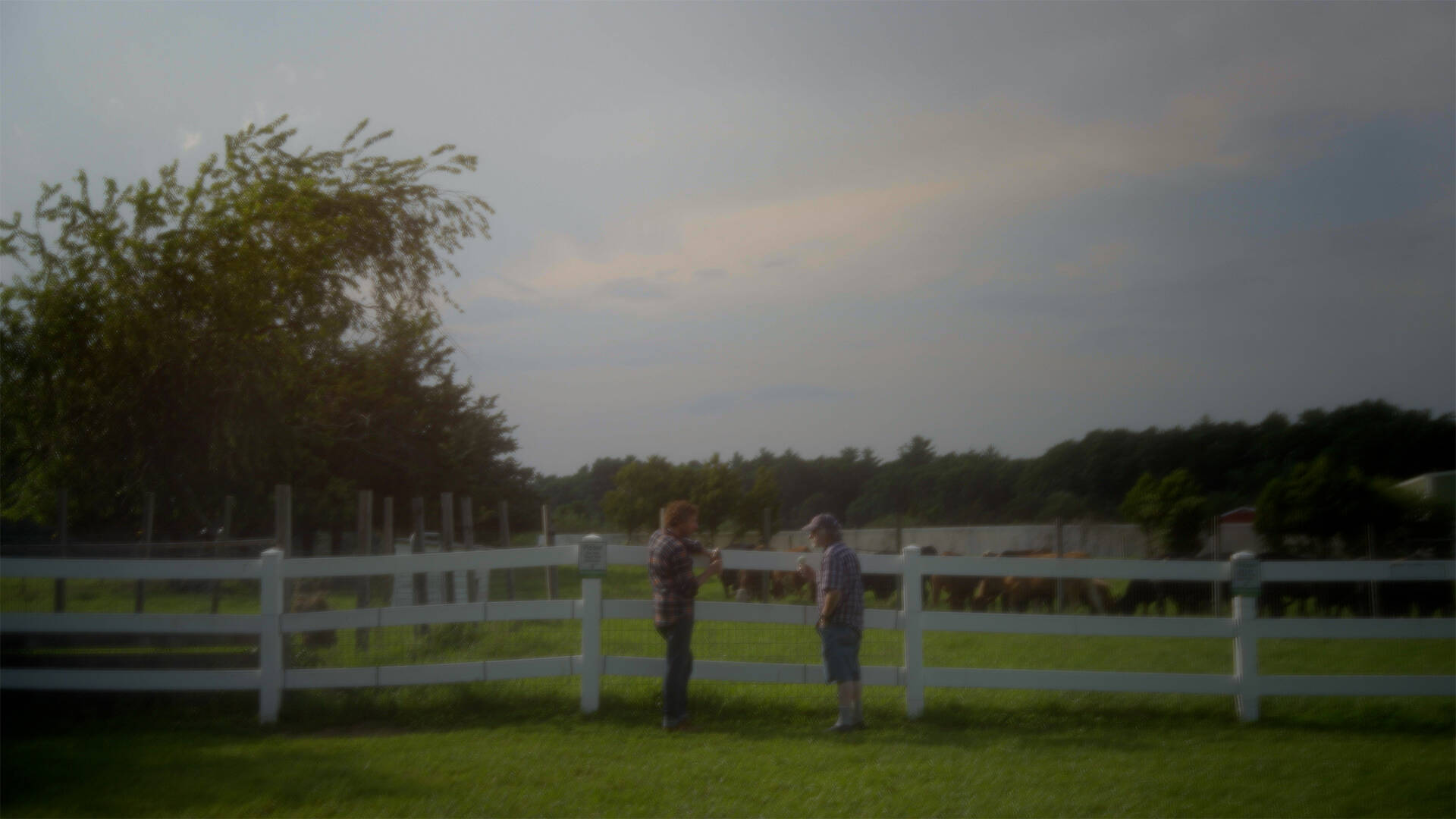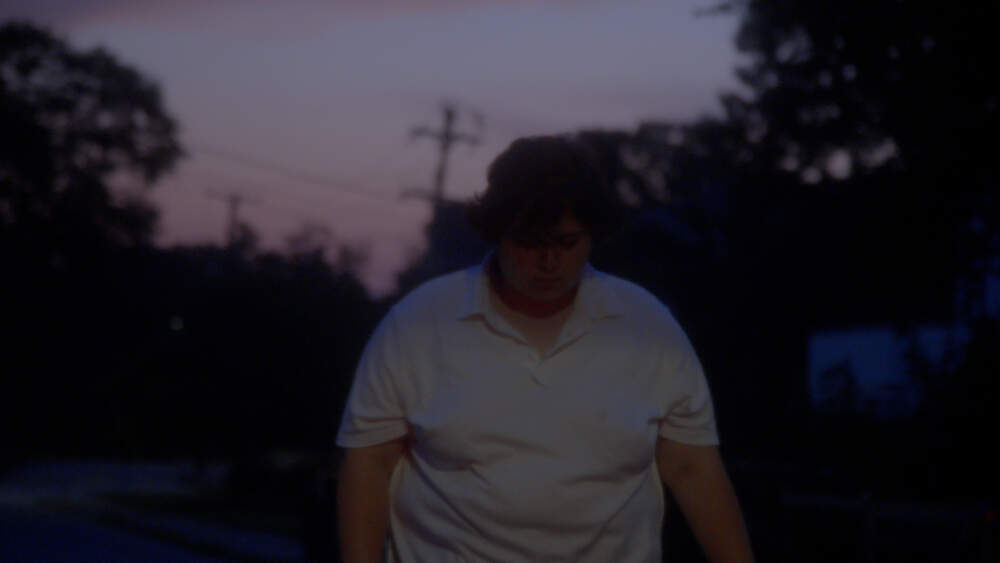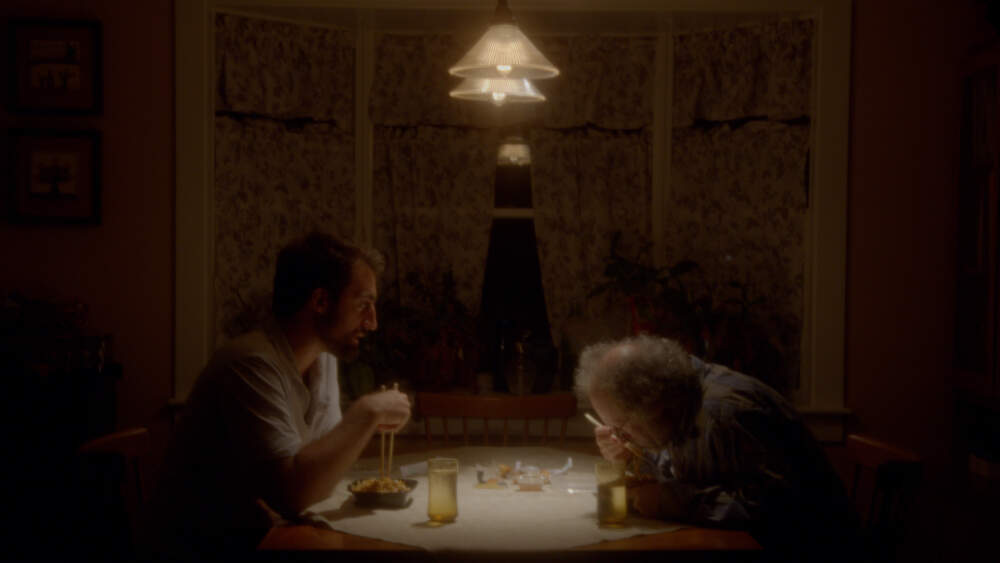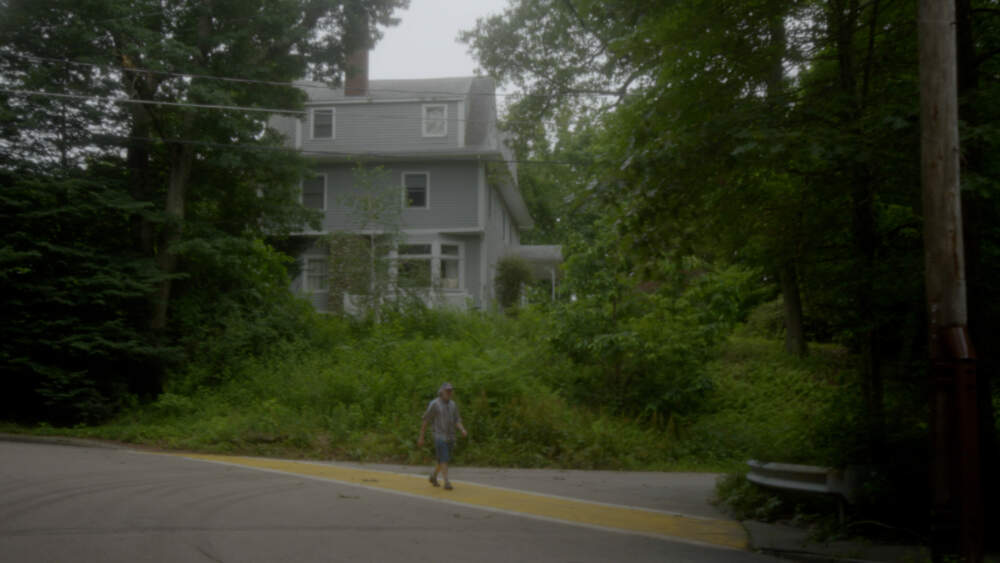Advertisement
Two filmmakers reflect on growing up in Sharon and their debut feature 'Hannah Ha Ha'

"Hannah Ha Ha," the quietly profound debut by Sharon natives Jordan Tetewsky and Joshua Pikovsky, unfolds over one summer in the life of a 25-year-old gig worker – Hannah – who also cares for her aging father. Hannah, slouchy and tousle-haired, at first gives off background-actor energy, but soon emerges as grounded and wryly funny. These qualities are tested by her brother Paul (Roger Mancusi), who launches a campaign to get his sister a “real” job before she turns 26 and is kicked off their father’s health insurance.
It is evident that Paul, like the rest of America, does not put much value in the caretaking and creative jobs that Hannah cobbles together. Yet it’s clear that Hannah is barely scraping by, just one bad stroke of luck away from losing her car, or worse. I spent much of the movie watching Hannah silently endure her brother’s lectures and wishing she would tell him off. But there are no grand speeches or tidy resolutions in “Hannah Ha Ha.” Like so many of us, Hannah finds herself at a loss for words in moments of adversity. Instead, she fumbles, taciturn, toward a more muted act of resistance.
Pikovsky and Tetewsky grew up in Sharon and filmed “Hannah Ha Ha” in and around their hometown on a tiny budget. They cast Hannah Lee Thompson, a musician from Baltimore who is also a friend of Tetewsky’s, in the titular role, and Tetewsky’s father, Avram Tetewsky, in the role of Hannah’s father, also named Avram. (Are you noticing a pattern here?) “Hannah Ha Ha” is the pair’s first full-length feature, and it owes much to the films of Kelly Reichardt, Robert Altman and the mumblecore movement of the early 2000s. (The title is a play on Andrew Bujalski’s 2002 mumblecore touchstone “Funny Ha Ha,” about a group of aimless 20-somethings living in Allston.)
Still, Tetewsky and Pikovsky imbue the film with their own aesthetic stamp. They capture the hazy heat of summer in New England in lingering shots of nature that are so soft they look blurry – a technique that was achieved by stretching pantyhose over the camera lens. The filmmakers’ use of sound is intensely tactile, too; the air is thick with cricket and bird song, and sometimes you can hear the actors breathing.
“Hannah Ha Ha” was recently selected as a New York Times "critic’s pick" and will run for a week at the West Newton Cinema beginning June 30. Recently, I caught up with Pikovsky and Tetewsky over Zoom from their respective homes. (Pikovsky lives in Worcester and Tetewsky splits his time between New York and L.A.) The following interview has been edited and condensed for clarity.
Why did you decide you wanted to set a film in Sharon?
Jordan Tetewsky: We wanted to cater the writing to what we knew and what we had access to. So a lot of it was simply out of necessity, necessity to keep it on a low budget scale and just use all the connections that we could. We also like our hometown.
Joshua Pikovsky: There's a lot of great things [about] your hometown. You have parents’ houses, you know, so people can stay there; you have free housing. You have garages you can store gear in, you have random friends and random townies that you can enlist into service against their will to be PAs or actors or leads in the movie.
What was it about Hannah Lee Thompson that you – I mean, I know she's your friend, but what was it that was so compelling about her?
Pikovsky: She's very expressive. Very expressive face, very expressive eyes. And she's just such a cool person.
Tetewsky: She can make me laugh from the gut like no one else. There's not as much of that side of her in this movie, but I just think she's incredibly charming. And I think audiences can kind of instantly feel that.
Well, what did you think? Did you like her?

Oh, I loved her. I was very compelled by her. But you could tell that she was probably not a very experienced actor. I don't know how you could tell, because she was still very good, but she didn't have that “actor” [quality]. I don't know. You couldn't see her acting, I guess.
Pikovsky: I know what you mean. That's one of the nice things with non-actors sometimes, is that there is this authenticity. There's a certain poise that actors affect and sometimes it can be really strong and add a lot of presence, but there is a, you know, “acting” quality to it. And I do think Hannah is really good at just feeling very natural onscreen.
Watching [the movie], I felt like it inverts a lot of what a more classic, millennial coming-of-age film does, which is usually that [the main character] is this loser that hasn't tapped into their real potential and they have to figure it out and they keep making mistakes.
Pikovsky: Yeah, it does follow a different structure, where she actually does have things figured out more than most people do. Maybe not in a conventional career way, but in a very meaningful way. She has a lot of stuff figured out for herself. And it's actually about her getting knocked off-path by people who think they know better.
Was that a thought you had at the start, or did it evolve out of your casting and writing the character?
Pikovsky: I feel like I've always been very attached to stories like that. When I was a kid, I really loved the movie “Harvey” with Jimmy Stewart. … [It’s about] this guy who has this imaginary rabbit friend. He's a super kind, sweet, nice guy, who just has this quirk where he has this big imaginary rabbit he talks to. I think his family finds it very off-putting and eventually they [try to] get it treated [so] he stops seeing the rabbit. … I feel like I've always been really attached to those kinds of stories where people who seem like they are on the fringes or on the margins or out of the norm, they're shaped by the people around them into something less unique and less special.
Tetewsky: Society just projecting onto people that are offbeat but harmless and doing their own thing and doing it well.
I'd love to hear how you conceived Paul's character. He's such a bummer.
Tetewsky: He's just a character that's drank the Kool-Aid.
Pikovsky: I think Paul is a tricky character, because I get really fired up and once we start writing characters like that, it's really hard for me to pull back. … And Jordan, in this case, actually had a very good, strong instinct to dial it back a little bit and to make him feel more like a real person. Initially, it was the most scathing parody of a yuppie you could imagine.

Tetewsky: He is doing what he thinks is best at the expense of not understanding or giving his sister any credit. He's one of these people that really thinks he understands his sister very well, but he is just missing the mark entirely.
Pikovsky: I think there's a tragic aspect to his character, too, especially by the end, where you realize that he really does care a lot about Hannah. But the problem is that it doesn't seem like he will really ever truly understand why there's a distance between them. And he's perceptive enough, obviously, to sense that there is this distance. But he can't understand what it is about what he's doing and the way he views the world that will always basically keep this distance between him and Hannah.
I think that is a sort of tragic aspect, and I think that's in a lot of relationships, just out in the world, whether it's siblings or friends. I think that it's very common, unfortunately.
Any other influences that are worth naming for this film?
Pikovsky: Kelly Reichardt’s another one Jordan got me into. “Old Joy” and “Wendy and Lucy;” those are the two big ones that he got me to watch. Those movies really affected me a lot, both in terms of just watching as a viewer, but then also the approach with writing and filming.
What was it about “Wendy and Lucy”?
Tetewsky: It's about someone sort of on the fringes, struggling through, I think, it's two pretty horrible days where just about everything goes wrong, but it doesn't feel forced. … Josh and I often talk about movies where a lot of times it's characters making really bad choices to get there, whereas this is external forces.
Pikovsky: I think a lot of people don't understand how hard it is to be poor in America. They don't understand just how every single force is working against you to keep you down and how everything is so much harder. And I think “Wendy and Lucy” just shows you, in detail, how everything is just rigged against you in that way. Like every little logistical thing, ever. Everything is just made to make your life harder and to punish you.
But at the same time, this isn't “Wendy and Lucy.” Like, you actually haven’t attacked desperate poverty, exactly. It's this other thing.
Tetewsky: I think Paul would see Hannah becoming that very easily. Which, there is, unfortunately, an accuracy to his take there.
Pikovsky: I think the key is that Hannah is in a precarious situation. Yes, she's not impoverished, but she's in the precariat. I think things could turn bad for her very easily.
I mean, that is the way that her brother [shows] this small kernel of real care. He's not wrong. It's so annoying!
Pikovsky: Exactly. Yeah. I think that's the central question of the movie, which is: why have we created a situation where he's not wrong? Technically, he's not wrong. But why is it fair that someone like her, who cares so much [for] people around her, works hard, does stuff for her community, why is it the case that life would become harder and harder and harder for her as she gets older?
I think this sort of gets back to de-emphasizing the individual. At the end of the movie, I don't even really think we're attacking Paul, at this point, because we see that he cares about his sister. We see that he's not technically wrong, unfortunately. It's more about the forces that have created the situation. We refocus, I think, on the larger picture.

I did also want to ask about the sound and your approach to how you recorded it and mixed it.
Tetewsky: Do you hate all the people chewing loudly?
I should hate it, but I didn’t.
Tetewsky: That's what it's like being around my father and all these people. It's a very heightened experience.
Pikovsky: Jordan does all the mixing, and I feel like I actually learned a lot about Jordan's sensory perception of the world. When he sends the initial mix, it's like, ‘Oh my God, is this how you perceive reality?’ Like, all the chewing sounds are louder than dialogue. [laughs]
There were times where [the actors] were clearly mic'd up, and you can hear them breathing.
Tetewsky: It's definitely not conventional, but I do like all that stuff. And I do like the feeling that you're – I mean, of course, this is the wrong genre for it – but the feeling that you're just catching things, almost like a spy would or something. But, I don't know. I like those choices. A lot of people would say they're bad choices, but I'm into them.
Pikovsky: What I'll say is, we got the chewing sounds down to a volume that I find acceptable. But I want you to know that the volume they are at in the film right now is not what Jordan's initial preference was. And I think that's important for everyone to know.
Editor's Note: A portion of this interview originally appeared in WBUR's weekly arts and culture newsletter, The ARTery. If you like what you read and want it in your inbox, sign up here.
This article was originally published on June 22, 2023.

